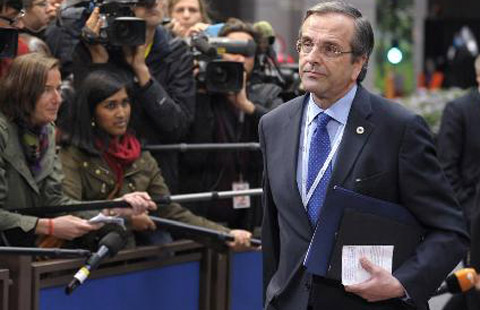
Mutual respect key for good relations
Comments Print Mail Large Medium Small
China-UK ties, not always smooth, can become model for world
The United Kingdom recognized the People's Republic of China in January 1950, just a few months after New China was born.
But the development of bilateral relations between the nations has not always been smooth.
The UK, for example, has not always shown enough respect for China's core interests. Since former UK prime minister John Major welcomed the Dalai Lama in 1991, each British prime minister has met with the political exile, who has long been engaged in anti-China secessionist activities in the name of religion.
In October 2008, David Miliband, then British foreign secretary, issued a written ministerial statement acknowledging that the UK's Tibet policy had been clouded by the position the UK took at the start of the 20th century, a position based on the geopolitics of the time. The statement said that like every other European Union member state and the United States, the UK regards Tibet as part of the People's Republic of China. It made it clear to the Chinese government, and publicly, that it does not support Tibetan independence. Previously, the UK only acknowledged China's "suzerainty", rather than "sovereignty", over Tibet. Miliband said that the concept of suzerainty, or limited authority, was outdated.
However, British Prime Minister David Cameron and Deputy Prime Minister Nick Clegg met in London with the Dalai Lama in May 2012, delivering a blow to the development momentum of China-UK relations. It was not until Cameron started a three-day official visit to China in December 2013 that China-UK relations finally crossed that hurdle.
Both China and the UK are permanent members of the UN Security Council and also important members of the Group of 20 major industrialized and emerging economies, and hold important positions in dealing with international issues. Therefore, close cooperation between the two countries not only works well for both sides diplomatically and strategically, but also is conducive to maintaining world peace and promoting common development.
Gerard Lyons, chief economic adviser to London Mayor Boris Johnson, said that the UK should focus on fostering good relationships with two countries: Germany and China. Booming China-UK economic and trade relations can help stimulate economic recovery in the UK. The two economies are highly complementary, especially in the fields of manufacturing, finance and technology, and there is great potential for further mutually beneficial cooperation.
China's extensive and profound civilization has a long history. Britain led world civilization in modern times, and made an enormous contribution to the development of human civilization. As the first developed country to industrialize completely, Britain has advanced technology and management experience in the fields of science, technology and education, of which China is in urgent need. Therefore, there are many opportunities for cooperation in these areas.
The development of bilateral relations must be based on mutual respect. But some British media outlets prefer to view China with prejudice, and frequently publish wild stories and theories. For example, The Sunday Times published an article on June 2, 2013 with a sensational headline, "Blair is dupe in Chinese spy plot", criticizing former prime minister Tony Blair for making a pitch for China at a conference on philanthropy hosted by the China Association for International Friendly Contact in Beijing in November 2012.
The Sunday Times, based on its own "research", concluded that the CAIFC is a front organization for the department of the People's Liberation Army that runs psychological warfare and covert influence operations against foreign political and military leaders.
There have been many more articles that have made irresponsible remarks on China's investments in the UK. British magazine The Economist published a number of articles about China's foreign investment, and the information these articles transmitted is bad for China.
For example, in an 2010 article entitled "China buys up the world", the magazine said "Chinese buyers - mostly opaque, often run by the Communist Party and sometimes driven by politics as well as profit - have accounted for a tenth of cross-border deals by value this year, bidding for everything from American gas and Brazilian electricity grids to a Swedish car company, Volvo. Chinese firms are going global for the usual reasons: to acquire raw materials, get technical know-how and gain access to foreign markets. But they are under the guidance of a state that many countries consider a strategic competitor, not an ally."
On December 2, 2011, while delivering a speech entitled "China-Europe Partnership in Progress" at the British government-sponsored Lanting Forum, former vice-foreign minister Fu Ying said, "China needs to approach criticism from Europe in two ways. We will accept reasonable ones for our own improvement, and at the same time, make our argument heard where there are misunderstandings and biases. China needs to have a more open mind for the world and stronger capacity to participate in world affairs."
The opinion also applies to China-UK relations. In the process of enhancing bilateral mutual understanding, China also needs to approach criticisms from the UK in the same two ways. Meanwhile, the establishment of the China-UK high-level cultural exchange mechanism is bound to promote mutual understanding between the two countries.
President Xi Jinping summarized the new type of China-US relationship as "no conflict and no confrontation", "mutual respect" and "cooperation toward win-win results". In fact, the UK is a big power, too, and China also should establish a new pattern of China-UK relations that also feature no conflict or confrontation, mutual respect and cooperation toward win-win results, striving to make China-UK engagement a new model of relationships between major countries.
The author is deputy director of the Institute of European Studies at the Chinese Academy of Social Sciences.
(China Daily European Weekly?06/13/2014 page11)




